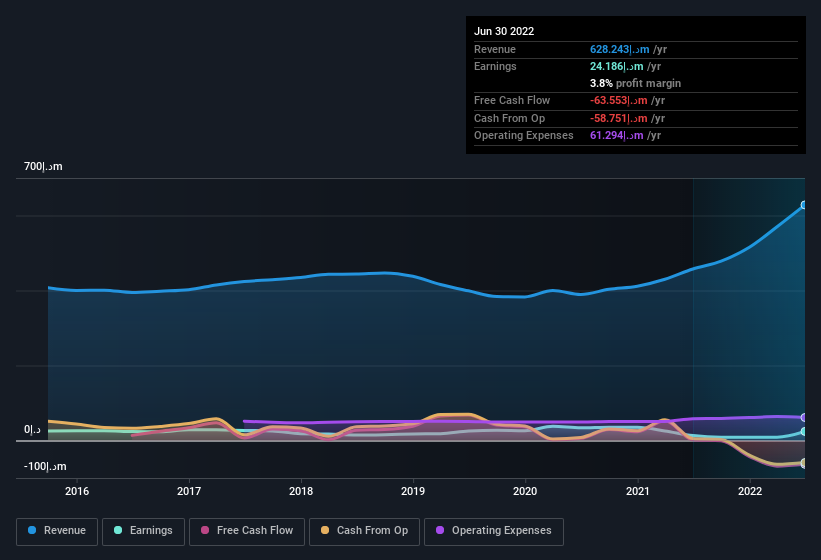- United Arab Emirates
- /
- Food
- /
- DFM:UFC
United Foods Company (PSC)'s (DFM:UFC) Promising Earnings May Rest On Soft Foundations

United Foods Company (PSC) (DFM:UFC) announced strong profits, but the stock was stagnant. Our analysis suggests that shareholders have noticed something concerning in the numbers.
View our latest analysis for United Foods Company (PSC)

Zooming In On United Foods Company (PSC)'s Earnings
One key financial ratio used to measure how well a company converts its profit to free cash flow (FCF) is the accrual ratio. The accrual ratio subtracts the FCF from the profit for a given period, and divides the result by the average operating assets of the company over that time. The ratio shows us how much a company's profit exceeds its FCF.
That means a negative accrual ratio is a good thing, because it shows that the company is bringing in more free cash flow than its profit would suggest. While having an accrual ratio above zero is of little concern, we do think it's worth noting when a company has a relatively high accrual ratio. Notably, there is some academic evidence that suggests that a high accrual ratio is a bad sign for near-term profits, generally speaking.
United Foods Company (PSC) has an accrual ratio of 0.31 for the year to June 2022. Therefore, we know that it's free cashflow was significantly lower than its statutory profit, raising questions about how useful that profit figure really is. Even though it reported a profit of د.إ24.2m, a look at free cash flow indicates it actually burnt through د.إ64m in the last year. We saw that FCF was د.إ1.8m a year ago though, so United Foods Company (PSC) has at least been able to generate positive FCF in the past.
Note: we always recommend investors check balance sheet strength. Click here to be taken to our balance sheet analysis of United Foods Company (PSC).
Our Take On United Foods Company (PSC)'s Profit Performance
United Foods Company (PSC)'s accrual ratio for the last twelve months signifies cash conversion is less than ideal, which is a negative when it comes to our view of its earnings. Therefore, it seems possible to us that United Foods Company (PSC)'s true underlying earnings power is actually less than its statutory profit. The silver lining is that its EPS growth over the last year has been really wonderful, even if it's not a perfect measure. Of course, we've only just scratched the surface when it comes to analysing its earnings; one could also consider margins, forecast growth, and return on investment, among other factors. In light of this, if you'd like to do more analysis on the company, it's vital to be informed of the risks involved. Case in point: We've spotted 4 warning signs for United Foods Company (PSC) you should be mindful of and 3 of these are a bit concerning.
Today we've zoomed in on a single data point to better understand the nature of United Foods Company (PSC)'s profit. But there are plenty of other ways to inform your opinion of a company. For example, many people consider a high return on equity as an indication of favorable business economics, while others like to 'follow the money' and search out stocks that insiders are buying. While it might take a little research on your behalf, you may find this free collection of companies boasting high return on equity, or this list of stocks that insiders are buying to be useful.
If you're looking to trade United Foods Company (PSC), open an account with the lowest-cost platform trusted by professionals, Interactive Brokers.
With clients in over 200 countries and territories, and access to 160 markets, IBKR lets you trade stocks, options, futures, forex, bonds and funds from a single integrated account.
Enjoy no hidden fees, no account minimums, and FX conversion rates as low as 0.03%, far better than what most brokers offer.
Sponsored ContentNew: AI Stock Screener & Alerts
Our new AI Stock Screener scans the market every day to uncover opportunities.
• Dividend Powerhouses (3%+ Yield)
• Undervalued Small Caps with Insider Buying
• High growth Tech and AI Companies
Or build your own from over 50 metrics.
Have feedback on this article? Concerned about the content? Get in touch with us directly. Alternatively, email editorial-team (at) simplywallst.com.
This article by Simply Wall St is general in nature. We provide commentary based on historical data and analyst forecasts only using an unbiased methodology and our articles are not intended to be financial advice. It does not constitute a recommendation to buy or sell any stock, and does not take account of your objectives, or your financial situation. We aim to bring you long-term focused analysis driven by fundamental data. Note that our analysis may not factor in the latest price-sensitive company announcements or qualitative material. Simply Wall St has no position in any stocks mentioned.
About DFM:UFC
United Foods Company (PSC)
Engages in the manufacturing, processing, and marketing of vegetable ghee, cooking oil, margarine, butter, and fat products in the United Arab Emirates, rest of Gulf Cooperation Council, and internationally.
Flawless balance sheet slight.
Market Insights
Community Narratives



